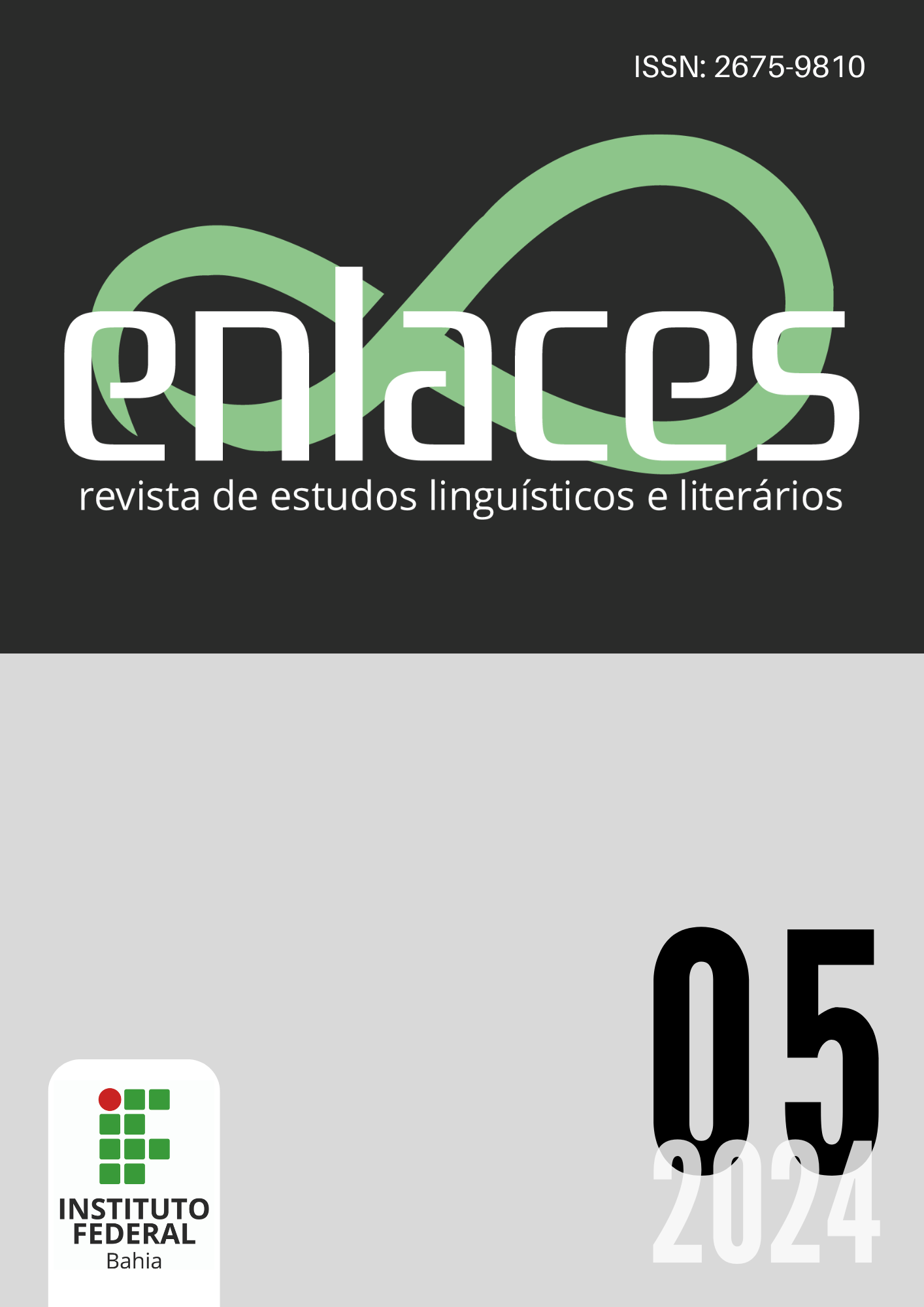But have you ever seen a werewolf? The anaphoric strategies of the direct object
A sociolinguistic analysis of the afro-bahian rural variety
DOI:
https://doi.org/10.55847/enlaces.v5i1.1181Keywords:
Anaphoric direct object, Variation, Linguistic contactAbstract
This paper analyzes the strategies of anaphora of the direct object in the Maracujá community, correlating them with social and linguistic factors. This phenomenon, essential for differentiating between language variants, has attracted the attention of many researchers in recent years. The anaphoric direct object (ODA) not only illustrates the particularities of Brazilian Portuguese, but also serves as an indicator of the social interactions and linguistic hierarchies present in the speech communities. Following the theoretical-methodological assumptions of variationist sociolinguistics (Weinreich; Labov; Herzog, 2006; Labov, 2008). In this first description made with the data collected, the preference of the speakers for the use of the empty category (70%), anaphoric noun phrase (17%) and the lexical pronoun (13%) was recorded, there were no resumptions with the accusative clitic. The analysis took into account the semantic trait and the social variables gender and age group, verifying to what extent the sex of the the informant, age group and animacy of the referent can influence variable use. The analysis of the distribution of the empty category and lexical pronoun variants according to the semantic trait of animacity reveals that pronominal choices in rural Afro-Brazilian Portuguese are strongly influenced by the animated status of the antecedent. Connecting with the classic research of Duarte (1986), Cyrino (1994), Figueiredo (2004). The results found in this analysis with the preliminary data allowed to make a previous description of the behavior of the Passion Fruit community in relation to the phenomenon.
References
ALKMIM, T. M. Sociolinguística. In: MUSSALIM, F.; BENTES, A. C. Introdução à linguística: domínios e fronteiras. 8.ed. São Paulo: Cortez,
Cap. 1, p. 21-47.
BRIGHT, W. As dimensões da Sociolinguística. In: FONSECA, M. S. V da; NEVES, M. F. (Org.). Rio de Janeiro: Eldorado, 1974.
BECHARA, E. Moderna gramática portuguesa. Rio de Janeiro: Lucerna, 2009.
CAMACHO, R. G. Sociolinguística. In: MUSSALIM, F.; BENTES, A. C. Introdução à linguística: domínios e fronteiras. 8.ed. São Paulo: Cortez, 2008. Cap. 2, p. 49-74.
CAMACHO, R. G. Compromisso teórico com a natureza inerentemente social da linguagem. In: CAMACHO, R. G. Da linguística formal à linguística social. São Paulo: Parábola, 2013. p. 25-36.
CEDRAZ, A. C. do C. Ancestralidade, memórias e sociabilidades na comunidade quilombola do Maracujá, Conceição do Coité – Ba (1870 – 1950) / Ana Cláudia do Carmo Cedraz. – Salvador, 2021.
CEZARIO, M. M.; VOTRE, S. Sociolinguística. In: MARTELOTTA, M. E. Manual de linguística. São Paulo: Contexto, 2008. p. 141-155.
CYRINO, S. M. Observações sobre a mudança diacrônica no português do Brasil: objeto nulo e clíticos. In: ROBERTS, I.; KATO, M. A. (Org.). Português brasileiro: uma viagem diacrônica. Campinas: Ed. da Unicamp, 1993.
CYRINO, S. M. O objeto nulo no português do Brasil: um estudo sintático-diacrônico. 1997. Tese (Doutorado) – UNICAMP, Campinas, 1994. [Publicada em 1997 pela Ed. da Universidade Estadual de Londrina].
COELHO, I. L.; GÖRSKI, E. M.; NUNES DESOUZA, C. M.; MAY, G. H. Para conhecer sociolinguística. São Paulo: Contexto, 2018.
CUNHA, C. F. da; CINTRA, L. F. L. Nova gramática do português contemporâneo. Rio de Janeiro: Lexikon, 1985.
DUARTE, M. E. L. Variação e Sintaxe: clítico acusativo, pronome lexical e categoria vazia no português do Brasil. Dissertação de mestrado. São Paulo, 1986.
FIGUEIREDO, M. C. V. de. O objeto direto anafórico no dialeto rural afro-brasileiro. 2004. Dissertação (Mestrado em Letras e Linguística) - Universidade Federal da Bahia, Salvador.
FIGUEIREDO, C. O objeto direto anafórico no dialeto rural afro-brasileiro. Estudos Linguísticos e Literários, salvador, n.33/34, 2006. p. 35-48.
LABOV, W. Padrões sociolinguísticos. Tradução: Marcos Bagno, Maria Marta Pereira Scherre, Caroline Cardoso. São Paulo: Parábola Editorial, 2008 [1972].
LUCCHESI, D.; BAXTER, A. N.; RIBEIRO, I. (Org.). O português afro-brasileiro. Salvador: EDUFBA, 2009.
LUCCHESI, D. História do contato entre línguas no Brasil. In: LUCCHESI, Dante; BAXTER, A. N.; RIBEIRO, I. (Org.). O português afro-brasileiro. Salvador: EDUFBA, 2009. P. 41-71.
PARCERO, L. M. de J. Fazenda Maracujá. 2007. 192 f. Tese (Doutorado), Instituto de Letras, Universidade de Campinas.
ROCHA LIMA, C. H. da. Gramática normativa da língua portuguesa. 49. ed. Rio de Janeiro: José Olympio, 2011 [1957].
WEINREICH, U.; LABOV, W.; HERZOG, M. I. Fundamentos empíricos para uma teoria da mudança linguística. Tradução de Marcos Bagno. São Paulo: Parábola, 2006.
TARALLO, F. A pesquisa sociolinguística. ;8. ed. São Paulo: Ática, 2007.
Downloads
Published
How to Cite
Issue
Section
License
Copyright (c) 2024 Cinara de Andrade Silva Santana

This work is licensed under a Creative Commons Attribution-NonCommercial-NoDerivatives 4.0 International License.
Os autores que publicam nesta revista concordam com os seguintes termos:
-
Autores mantêm os direitos autorais e concedem ao periódico o direito de primeira publicação, com o trabalho simultaneamente licenciado sob a License Creative Commons Attribution do tipo Attribution-NonCommercial-NoDerivatives 4.0 International (CC BY-NC-ND 4.0), que permite o compartilhamento do trabalho com reconhecimento da autoria e publicação inicial no periódico e não permite alterá-los de nenhuma forma ou utilizá-los para fins comerciais;
-
Autores têm autorização para assumir contratos adicionais separadamente, para distribuição não exclusiva da versão do trabalho publicado nesta revista (ex.: publicar em repositório institucional ou como capítulo de livro), com reconhecimento de autoria e publicação inicial neste periódico.














